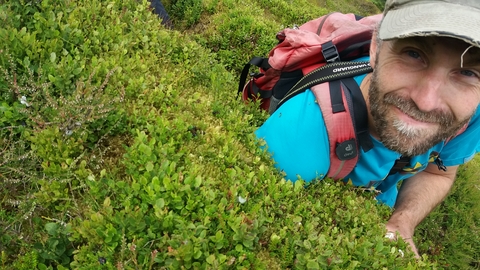
Lee Schofield
'It takes grit to fight in nature’s corner, but in the teeth of the crises facing wildlife and the climate, we need to strengthen our resolve, have the uncomfortable conservations and find ways to build alliances with those who we might not always agree.'
Lee Schofield
As site manager of RSPB Haweswater, Lee is responsible for overseeing conservation work across an upland mosaic of woodland, bog, mountain and meadow covering thirty square kilometres. He recently wrote Wild Fell, an account of the challenges and opportunities the landscape provides.
'I was lucky to have a wild childhood. Growing up in deepest Devon, down a hedge-lined lane with grass growing down the middle, I was surrounded by nature. With the blinkers of childhood, I assumed everyone had the chance to pick wild strawberries on the walk home from the bus, to find grass snakes and slow worms in the compost. Nature wasn’t something that seemed fragile or in need of help; it was the matrix in which I grew up.
That, of course, didn’t last. Primary school poster campaigns to save the rainforests and to plug the hole in the ozone layer sowed the seed the grew into greater environmental awareness. I realised that not all was as rosy as I’d once thought. By the time I came to choose what I wanted to do with my life, helping nature was right at the top of the list.
After studying Zoology and Ecological Management, I put in the hours as a volunteer before securing the first of several short-term conservation jobs, the last of which landed me in Cumbria. I spend two happy years restoring Drumburgh Moss with Cumbria Wildlife Trust before I was lured away by the prospect of a permanent contract as site manager for the RSPB at Haweswater.
I can say with hand on heart that I have my dream job. I get to work with a fantastic team of people breathing life back to a sizeable wedge of one the most beautiful places in the country. But it hasn’t all been plain sailing. Changing how land is looked after in the Lake District can be a controversial business, especially when farming is concerned.
There has been plenty of opposition to what we’re doing at Haweswater. It takes grit to fight in nature’s corner, but in the teeth of the crises facing wildlife and the climate, we need to strengthen our resolve, have the uncomfortable conservations and find ways to build alliances with those who we might not always agree.
Restoring the land at Haweswater will be a long a slow process, but we’re starting to see the fruits of our labours. Salmon returned to spawn after we restored the meanders on Swindale Beck. Red Grouse have returned to Mardale Common following changes to grazing. Thousands of trees and wildflowers are flourishing thanks both to planting and natural regeneration. It has relied on teamwork, not least with United Utilities, who own the land at Haweswater and who we work in partnership with. These green shoots of recovery are a flavour of what’s to come, and give me, my colleagues and our brilliant volunteers all the energy and inspiration we need to keep going.'
